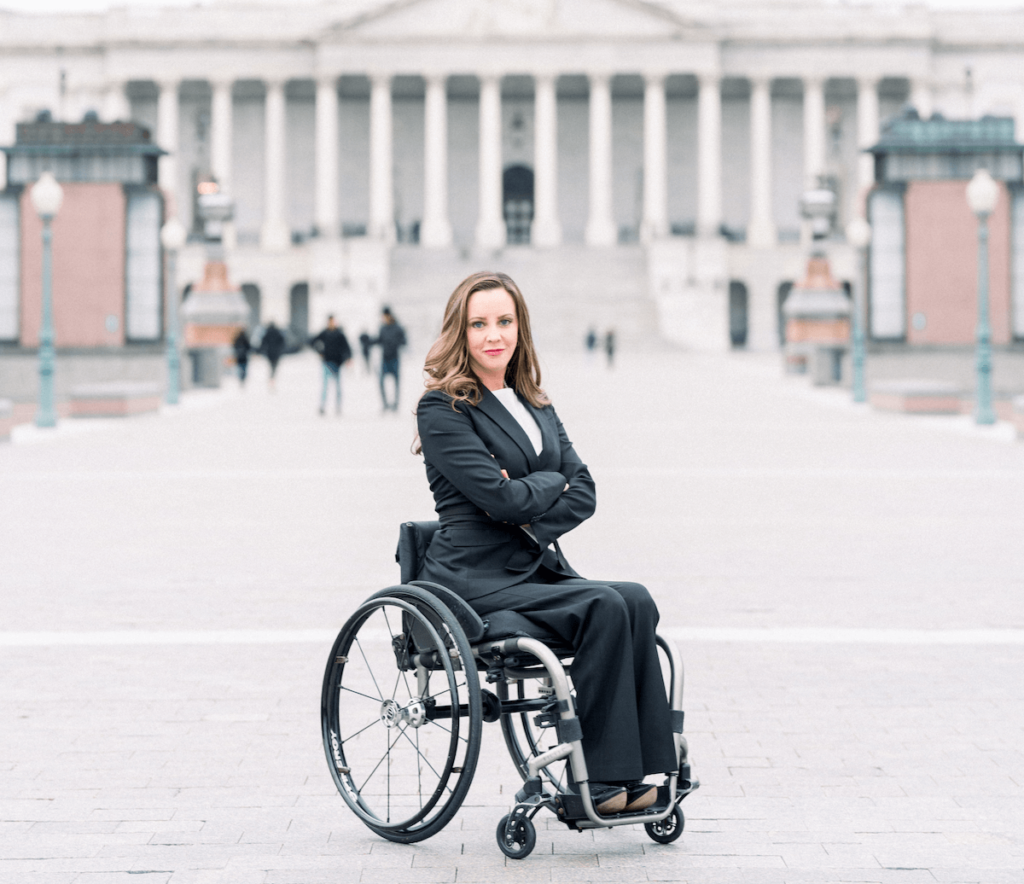For someone who uses a wheelchair, life can be limited to staring at the walls of their home.
Leaving the house, affording a vehicle, having an adapted car they can drive or even having the ability to access public transportation can be an insurmountable obstacle.
“There needs to be more visibility in disability, but we can’t do that if we have no way to get people out of their homes,” says College of Law alumna Kelley Brooks Simoneaux (’10). “Getting yourself out in the community is how someone in a wheelchair can start living their life again.”
And she should know.
As a law student, Simoneaux, was fortunate to travel the country competing in trial competitions while also serving as the president of the Student Bar Association. What makes that remarkable is that since the age of 16, Simoneaux has been navigating life from the seat of a wheelchair.
On Feb. 2, 2001, she buckled herself into the backseat of her high school friend’s SUV. The lap belt wasn’t enough to protect her from injury when the driver crashed the SUV into a tree, and Simoneaux’s lower back was broken. She was left with internal injuries and was permanently paralyzed from the waist down.
Throughout the first few years after she graduated from law school, Simoneaux, now 36, became a plaintiff’s lawyer in civil matters taking on cases that forced her to go to battle against manufacturers like Ford Motor Company and Cooper Tires.
She enjoyed the challenge of representing those in whom she saw herself, she said.
“It excited me every day … to dig in, do the grunt work of an associate and learn as much as I could,” she said. “But I hadn’t really looked at the bigger picture.”
Simoneaux’s perspective began to change in 2017.
When her husband’s career moved the couple and their children to Washington, D.C., Simoneaux decided to open her own practice specializing in spinal cord injuries exactly. It was exactly 18 years after her own injury, and in the nation’s capital she met politically connected people and began seeing the interconnections of policy and law.
She’s since worked with lawmakers to offer input on transportation legislation for the disabled. She’s holding accountable wheelchair manufacturers who delay responses to customers about parts replacement and warrantees. She’s pressing packaging and mail service companies to place mail receptacles in positions that can be accessed by those who are in wheelchairs.
She’s even taken on Uber.
In June 2018, Simoneaux was commuting across Washington, D.C. on the way home from dinner with a friend. She called Uber for a ride and when the driver arrived and saw her in a wheelchair, he refused to take her to her destination.
“That just made me really angry,” she said. “I thought ‘I want to pay you to take me home and that should be the end of it. And it’s not. So why.’”
While other wheelchair users who’ve experienced similar treatment have joined class action lawsuits alleging Uber and Lyft are violating the Americans with Disabilities Act, Simoneux took a different path.
She established Wheel2Ride, an advocacy campaign targeting ride-sharing platforms and promoting policy changes that are inclusive of those with mobility challenges.
“I understand that change can happen at a glacial pace and that’s really frustrating for a lot advocates to know that’s your timeline, but it’s also challenging coming in and trying to correct these issues,” Simoneaux said.
Through Wheel2Ride, Simoneaux administered a survey via social media and learned that 83 percent of the disability community has faced discrimination in transportation.
Gathering that data, Simoneaux says, is just one of the approaches she’s taking as she advocates for change. She’s learned that a multi-prong approach – including lobbying at the federal, state and local levels while educating stakeholders – often yields the best results.
“I started my advocacy path in law school at UT and now to this day I’m continuing to build upon it,” she said. “It’s sometimes hard to make these situations feel like a huge win when you’re trying to chip away at it little by little.”
But living her life in a wheelchair has brought her the grit, determination and patience she needs to meet the challenges that face her on the job and within her community.
“The reality of being a person with a disability is that you are forced to encounter roadblocks and readjust all the time,” she said. “I’m pretty good at rebounding.”
___
This story was originally appeared in the Spring 2021 edition of Tennessee Law, the alumni magazine of the University of Tennessee College of Law. Photo courtesy of Nicole Babcock Photography.
